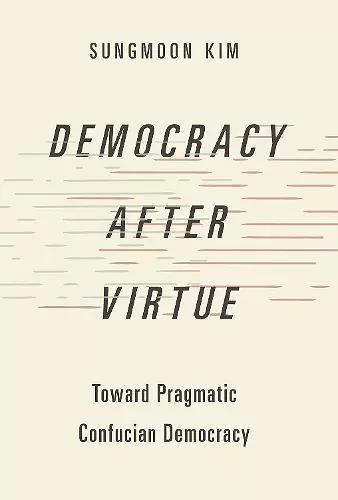Democracy after Virtue
Toward Pragmatic Confucian Democracy
Format:Paperback
Publisher:Oxford University Press Inc
Published:17th Jul '20
Currently unavailable, and unfortunately no date known when it will be back

Is Confucianism compatible with democracy? Ongoing debates among political theorists revolve around the question of whether the overarching goal of Confucianism--serving the people's moral and material well-being--is attainable in modern day politics without broad democratic participation and without relying on a "one person, one vote" system. One side of the debate--voiced by "traditional" Confucian meritocrats--argues that only certain people are equipped with the moral character needed to lead and ensure broad public well-being. They emphasize moral virtue over civic virtue and the family over the state as the quintessential public institution. Moreover, they believe that a system of rule headed by meritorious elites can better handle complex modern public affairs than representative democracy. The other side--voiced by Confucian democrats--argues that unless all citizens participate equally in the public sphere, the kind of moral growth Confucianism emphasizes cannot be fully attained. Despite notable differences in political orientation, scholars of both positions acknowledge that democracy is largely of instrumental value for realizing Confucian moral ends in modern society. It would seem that Confucians of both types have largely dismissed democracy as a political system that can mediate clashing values and political views--or even that Confucian democracy is a system marked by pluralism. In this book, Sungmoon Kim lays out a normative theory of Confucian democracy--pragmatic Confucian democracy--to address questions of the right to political participation, instrumental and intrinsic values of democracy, democratic procedure and substance, punishment and criminal justice, social and economic justice, and humanitarian intervention. As such, this project is not only relevant to the much debated topic of Confucian democracy as a cultural alternative to Western-style liberal democracy in East Asia, but it further investigates the philosophical implications of the idea and institution of Confucian democracy in normative democratic theory, criminal justice, distributive justice, and just war. Ultimately, Kim shows us that the question is not so much about the compatibility of Confucianism and democracy, but of how the two systems can benefit from each other.
Is it possible to be committed to both Confucianism and democracy? If not, which should have priority in cases of conflict? Political theorists have heatedly debated these questions over the last few decades. Sungmoon Kim has emerged as one of the most original voices in these debates, and he defends his views with rigor and erudition. * Daniel A. Bell, Shandong University, Perspectives on Politics *
[Democracy After Virtue] takes on the ambitious task of reconstructing pragmatic Confucian democracy, which integrates three components—political participation, the value of democracy, and procedure and substance. * Baogang He, Political Theory *
This book's contributions to questions important to the quest for Confucian democracy make it required reading for those in the field. * Andrew Lambert, CUNY College of Staten Island, Review of Politics *
Sungmoon Kim's new book is the closest thing we have to a fully developed political theory of Confucian democracy. Philosophically sophisticated and sociologically sensitive, it gives a highly distinctive account of what Confucian democracy is in its theoretical basis and normative commitments, how it works in important areas of practice, and why it promises to suit the reality in East Asia better than does either Confucian meritocracy or liberal democracy. Kim's wide-ranging command of democratic theory on the one hand and contemporary political Confucianism on the other makes this book also an excellent overview of the entire field."-Jiwei Ci, The University of Hong Kong
This meticulously argued book will further solidify Sungmoon Kim's reputation as a leading theorist of Confucian democracy. Kim's main goal here is to show what happens to Confucian political theory when one takes democracy deeply seriously. The book's two parts do this both abstractly and then with regard to concrete issues that have either been little-treated in the literature (criminal law) or discussed in ways that Kim shows to be open to new and distinctive approaches (economic equality and international relations)."-Stephen C. Angle, Wesleyan University
With the increased scholarly attention devoted to comparative political theory, this volume serves as a much- needed refinement of Confucian political thought... The first part of the book presents an overview of the author's own interpretation of the most vital version of this stream of political thought, which is described as pragmatic Confucian democracy. Chapters 2 and 3 evaluate the importance of democracy theory to Asian political thought, compare Schumpeter to Dewey, and examine the necessary balance between procedure and values. The second part of the book offers a study of pragmatic Confucian democracy in relation to specific policy concerns, including criminal justice challenges, economics, and humanitarian intervention. * H. L. Cheek Jr., East Georgia State College *
- Winner of 2019 CHOICE Outstanding Academic Title.
ISBN: 9780197528280
Dimensions: 155mm x 231mm x 18mm
Weight: 408g
274 pages